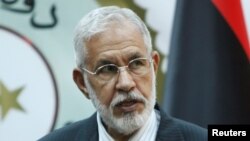Libya's U.N.-backed government has criticized U.S. President Donald Trump's temporary ban on its nationals and those of six other countries entering the United States, which put in question attendance at a high-profile conference on Libya planned in Washington for mid-February.
The executive order by Trump comes at a time of uncertainty over U.S. policy in Libya, which remains mired in the chaos that followed the NATO-backed 2011 uprising against longtime leader Moammar Gadhafi.
The U.N.-backed Government of National Accord (GNA) was strongly supported by former U.S. President Barack Obama's administration, but it has struggled to assert its authority in Tripoli and beyond.
Factions in eastern Libya aligned with a rival government and with powerful military commander Khalifa Haftar welcomed Trump's election, hoping for more support for their anti-Islamist stance.
'Unjust decision'
Trump's travel ban has angered some Libyans, including students studying or planning to study in the United States. GNA Foreign Minister Mohammed Siyala called it an "unjust decision" that should be reviewed.
"These actions represent racial discrimination on the basis of religion and are incompatible with human rights," he told local TV station Libya's Channel.
Authorities in eastern Libya declined to comment on the ban for days. A spokesman for the eastern-based government said Wednesday, however, that the order "could not be rejected," given Libya's own institutional confusion.
A member of the eastern parliament, Youssef al-Fakhri, said that despite Libya's political and security problems, the measure was "not appropriate."
The order appeared to put in jeopardy the participation of Libyans invited to a February 16 conference titled "Libya-U.S. Relations 2017: New Vision, Hope and Opportunities."
The event, co-hosted by the National Council on U.S.-Libya Relations, lists Libyan speakers, including two former prime ministers and the head of the National Oil Corporation. Several speakers are loyal to or connected with eastern-based factions.
"We are clearly concerned with the risk of denial of entrance to some of our key speakers and participants from Libya," Hani Shennib, the council's president, said in an email. "However, we are working diligently with authorities here in the USA and we are hopeful that a resolution to facilitate entrance of our conference participants will present in the next 2-3 days."
Exceptions to be sought
A GNA spokesman, Ashraf al-Tulti, told Reuters that Libya's foreign ministry would request exceptions from the U.S. Department of State for Libyan attendees.
Exceptions to the travel ban can be made on a case-by-case basis, and diplomatic visas are exempt.
Tulti, who was invited to attend the Washington conference and holds a diplomatic passport, said he was still waiting for a visa. One Libyan speaker said she had a visa but was still investigating whether she would be able to attend.
Under the order released Friday, travelers from Iran, Iraq, Libya, Somalia, Sudan, Syria and Yemen are banned from entering the United States for at least 90 days.
Homeland Security Secretary John Kelly said some countries "may not be taken off the list anytime soon, if they are countries that are in various states of collapse."





